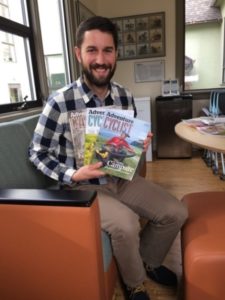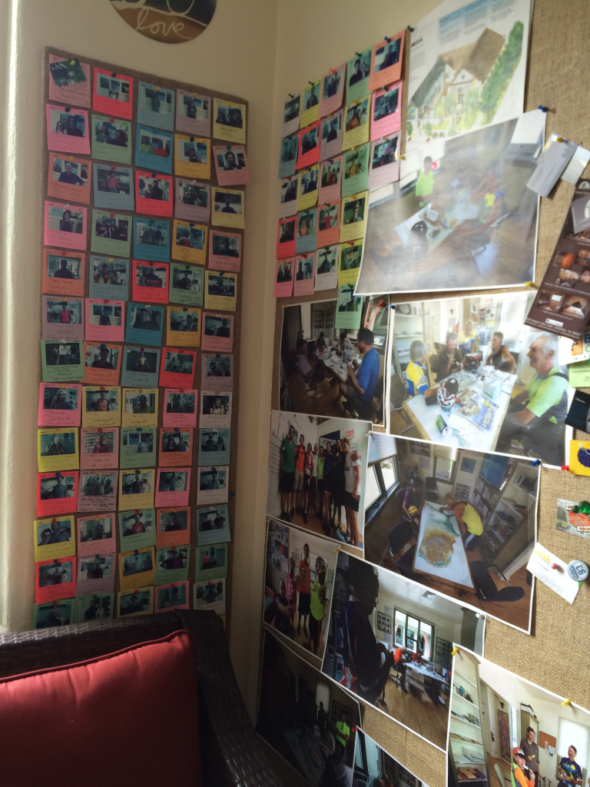
“I have many bikes.” Alex, editor-in-chief of Adventure Cyclist
“This building used to be a church,” says Alex Strickland, as he takes me on a tour of the Adventure Cycling office in Missoula, Montana. Founded in 1976 as part of a mass, cross-country bike ride called Bikecentennial, Adventure Cycling is a bicycle travel non-profit that promotes bike-friendly communities and provides bike trail maps, gear, and guided tours to its 49,000 members. Alex is editor-in-chief of Adventure Cyclist, the member magazine for Adventure Cycling. It’s published nine times a year and features bike travel narratives and gear reviews. Their latest issue has essays on bike camping in Norway and cycling while hungover in Albania.
They are the first interview I’ve done where there’s a cartography department. “We have a full-time staff of six mapmakers who are either researching new routes or updating the 45,000 miles of existing route all the time,” says Alex. Many of the bicycle routes run through Missoula, and at the office entrance is a wall of polaroids taken of cyclists who have stopped by the office this year for maps, gear, and free ice cream. About 1200 cyclists visit each summer. Alex has been cycling since he was a teenager growing up in Tennessee. I sat with him recently to talk about what it’s like to be the editor-in-chief of a cycling magazine.
Asta: You seem to have a really cool job, which includes getting hit with a baseball bat while testing gear. How’d you get this gig?
Alex: I grew up in Memphis and came out here for college [at the University of Montana] when I was 18. I graduated from the J-school [journalism school] here and worked in small newspapers for awhile in Northwest Montana. My wife and I both did our undergrads here and then she went to grad school at the University of Utah. When she went to grad school, I made the transition into PR and marketing down in Salt Lake and ended up working in the outdoor and bicycling industries. It was through working in the bicycling industry that I came back into contact with Adventure Cycling. I actually used to live across the street when I was in college…When this gig opened up last year, it was a chance to move back to Missoula…It’s pretty much a dream. To work for a bicycling magazine in Missoula, Montana, it’s absurd. They never told me about this in J-school.
Asta: What was your experience like working at small newspapers?
Alex: It was an incredible learning experience that I would not wish to repeat…That was sort of in the teeth of the recession. The general narrative of newspaper journalism is that newspapers can’t survive and they’re going down the tubes, but the small newspapers still seem to do pretty well financially and they still matter in their communities where nobody else is going to cover the land use meeting or go to the bake sale. It was interesting. Nobody gets rich and they’re always understaffed; you’re the chief cook and bottle washer always…But the thing you can never replicate from a newspaper job is you just have the excuse to call anybody and ask any question and meet interesting people every day.
Asta: What is your current day-to-day work as an editor like?

Polaroids of visiting cyclists at Adventure Cycling
Alex: During monthly production, at any given time, we are prepping and posting online content that corresponds with the issue that we’ve already sent to the printer but hasn’t landed in mailboxes yet. So [right now] we’re wrapping up Production Cycle A with online content. We’re in the midst of Production Cycle B, which is the issue we’re getting ready to send to the printer. So that’s working with our lead magazine designer and other staff to try and pull it all together, get it on the page, proofread, that sort of thing. And then we’re also in pre-production for Cycle C, which is copy and photos that are coming in to me from writers, and I’m reviewing those and getting them into queue. We have an off-site copy editor that we use. So I’m coalescing everything and getting them out the door to her and waiting for it to come back and get into the main production cycle. I’m basically a professional cat-herder. That was also not mentioned in J-school!
Asta: What do you do when you’re not in monthly production?
Alex: When we have off months, that tends to be a lot of contract writing, trying to plan out the next 12-18 months with our existing pool of contributors, people we’re seeking out and want to work with, and finding great pieces that have been submitted by our members. It’s trade show season for us, so I go down to the Outdoor Retailer trade show in Salt Lake City [in August]… And then there’s Interbike, which is the cycling trade show, in September in Vegas. We’ll go there and say we have 12 road tests that we need to line up for 2016. We’ll find the 12 bikes we want to review, make contact with those companies. As soon as we get back to the office, it’s logistics. When do the bikes come off the boat? When can we get them to a reviewer? Most of the people, ourselves included, that we work with live in the Mountain West, which means that the bicycle reviewing season in September is starting to get very short. So it’s either we’ve got to get them in before December or we can’t really review them until March because it’s going to snow. If that’s the case, if we can’t get a bike until March, that’s all right, but it means it needs to go in, you know, our October issue next year, the way the deadlines push out.
Asta: What kind of writing are you looking for in Adventure Cyclist?
Alex: Mike [Deme, the current design and media director who was the editor-in-chief for ten years], and his predecessors before him, have really put a focus on it being a readers’ magazine — longform stuff, which is awesome. We don’t want to sort of devolve into the listicles and things like that. We usually publish 3 full-length feature stories each issue and feature photographs alongside them. So you’re looking at 2500-word, usually first-person accounts, a travelogue of your bicycling touring experience, in whatever place you’re in. There’s also a gear component — road tests — which we work with professional [reviewers] on. Also, there’s the Final Mile, which is an essay, 1200-1500 words, that can really be about anything…and tends to be a good outlet for people who don’t have pictures [from their bike trip] or who have something really unique to say, which bicycle travelers often do.
Asta: Any new developments coming up for Adventure Cycling?
Alex: With next year being our 40th anniversary, we’re doing all these special 40th events…We run this website called bikeovernights.org, and the idea is that you don’t have to ride across the country and take 3 months off…Just leave work on Friday and cruise out to a park near you and camp and you can still ride back Saturday and mow the yard. So we’re doing a National Bike Travel Weekend in June 2016. We’re encouraging people around the country [to bike] and providing resources for them–where you are, just go out for the weekend…The weekend of July 15th, we’re doing the Montana Bicycle Celebration [in Missoula]. And that will correspond with the Tour of Montana bike race. It’s that same weekend. We’re inviting people to come to Missoula. We’ll have bike rides here…and a big reunion for people who rode in 1976 [for Bikecentennial]. In September, our third big event is Bike to Your National or State Park Day, which corresponds with the fee-free day on federal lands. We hope that National Bike Travel Weekend and the Bike to Your National/State Park Day end up being annual things for us.
Asta: Why do you like to cycle?
Alex: There is a certain element of — especially in mountain biking — it’s fun to go fast and there’s a certain sort of adrenaline-y thrill-seeking aspect to what I like about it. It, like running or hiking or anything else, is just an interesting, human-powered way to move through the landscape…A lot of bicycle touring in particular — I think a lot of people echo this — is that it’s sort of the Goldilocks medium. It’s quicker than walking. You’re not limited to, say, 20 miles a day. If you need to do 100 miles in a day, you can do that, you can cover some ground. But you’re also approachable. You’re not in a car. You’re moving slowly enough that you can see things, talk to people, interact. And so it’s this nice middle ground. And personally they’re fun to tinker with. I do enjoy the technical aspect.
Asta: What kind of bike do you have?
Alex: I have many bikes.
Asta: How many?
Alex: Oh gosh. I don’t know if I want that printed anywhere…Right now I think I have 7. I had to pare down when I moved back to Montana from Utah. Either bring the couch or bring two more bikes.
